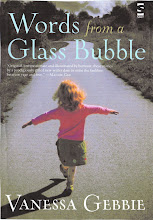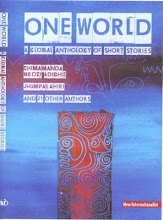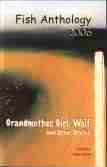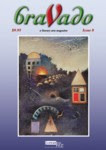

Today, the longest interview in the world (which Alex Keegan said this weekend he could have made even longer, but he was thinking of the readers) deals with his teaching. And Bootcamp. And far more importantly the driving beliefs behind both.
I have this theory, see. I think IF potential members of BC knew the reasoning behind the tough regime, they would get on faster, better. Less kicking. So maybe, just maybe, this is A Good Thing. And all that Jazz.
But first… I asked about his own writing processes. And got it wrong, naturally…
V: You say that to look too closely and deliberately at your own creative process stifles the very thing you want to encourage... you have to get these glimpses out of the corner of the eye. To look at them head on is like looking Medusa in the face.
A: Hmmm, did I say that? Oh dear. I ALSO say, examine, theorise, criticise, wonder, per-at, experiment, consider, "try to work out how" BETWEEN stories but when WRITING stories we should not care at all, and write drunk.
When writing we should let go and allow our unconscious free-rein and presume that the craft technique we have absorbed will apply itself automatically.
So it's not true (these days) (for me) that self-examination interferes with artistic process.
It MAY BE that it does temporarily for writers. It may be that they slip backwards for a while, but the more we understand about CRAFT, about the process, the better (ultimately) we can become
Do you remember my "John Aldridge Story"?
V: Football?!
A: Yup. I used to tell the anecdote of a footballer John Aldridge who came to Newport County. He was a natural, scored goals for fun. Newport County signed him. He went straight into the first team, raw as hell, scored about eight goals in 6 games, but then (we thought "why?") he was taken out of the first team and stuck in the reserves for six months "to learn how to play football."
When he got back into the first time he was rubbish. We all said, what have they done to Aldy?
The next season he was the hottest striker outside the top division, we were promoted, won the Welsh Cup, got into Europe... Two seasons later he transferred to a bigger club and then on to Liverpool and became an International player, then a successful manager.
He is the striker with the best overall record EVER
HERE is the point. Raw talent LOOKS good but it isn't remotely enough. It has to be allied with fundamental training, long hard lessons, growing experience.
Aldridge lesson ends.
Sometimes, we can "do something" but if we don't know HOW we do it, how do we know we can REPEAT it? If we examine and discover how we do things, what we do, for a while we may get too conscious... but once we get over that hump
we move to a higher level, and now this natural, random, insecure skill is solidified and enhanced.
V: I have an article somewhere. Hang on. Look, in 1066, a wet Wednesday it was…you said this:
"I know what I think. I just dont know how to express it. I don't have the tools, or the mathematical formulae, or the wondrous machines to reveal that there are quarks... I don’t have the mind that can deal with the idea that we, human beings, are almost toally space. ... nothingness across which darts energy.I know what my Spanish lady means. I can see her, feel what she is doing, sense the pain (and the beauty). It's just that when I look straight at it, my life gets in the way."
A: That's different Van. Are we confusing different things here?
V: Oh quite possibly.
A: I thought you were asking about examining CRAFT. To which I say yes, we must, because it is NOT mystical. But examine "the story I want to write" and I kill it because then I unleash the left-brain, consciousness, plotting etc.
So what is your question? About examining craft, technique, ways of expression, or "looking to hard at what I want to write today"? They are quite different. Look:
"I know what I think. I just don’t know how to express it….”
That is. I can sense, feel, smell "the area' (and the fuzzy - feeling I wish to express) but neither the precise thing "in a nutshell" or the precise route I will take to express it. BUT MY TECHNIQUE I KNOW. IT'S BUILT-IN AND I DON'T NEED TO THINK ABOUT IT NOW.
I don't have the tools, or the mathematical formulae, or the wondrous machines to reveal that there are quarks...
Again this is story. Like how hard is it to describe what love is, but we can write stories AROUND love and about love -
I don’t have the mind that can deal with the idea that we, human beings, are almost totally space. ... nothingness across which darts energy.
Again this is result, not the craft that gets me there.
I know what my Spanish lady means.
Yes, I mean I can sense the way she embodies my thoughts
but I dare not ARTICULATE them.
I can see her, feel what she is doing, sense the pain (and the beauty). It's just that when I look straight at it, my life gets in the way."
Yes, but "my life in the way" doesn't mean the craft gets screwed up! It means, if I remain semi-conscious, I am able to surprise myself but I still sound like me.
However, looking to hard causes me to become directly aware of the ideas and then I start to consciously adulterate the work, imaging readers, editors, how this might have been done by others.
I end up writing a pale imitation rather than something bloody.

V: Right. I get the difference…OK. You teach every day, whether face to face or online. Boot Camp Keegan, your online teaching presence, started many years ago and you have passed on what you know to hundreds of aspiring writers. Can you say something about all this? I do wonder about how teaching affexts ones own processes.
I certainly know a very well known poet was offered a teaching role at a prestigious University, and turned it down because he knew it would mean death to something. Any comments?
A: That might not be the same thing as (for example) me running `Boot Camp or being involved recently in "Tough Love Central" on Writers Dock. We don't "go to teach at a university" and merely teach.
There's paperwork, admin, politics, ass-kissing, travel, exams, paper to mark
boundaries we have to stay inside. Fer God's sake we have to WASH and get dressed to teach in class. It's basically "a day job" and probably very restrictive, so I can understand the poet's hesitancy.
OTOH it might mean EATING, and eating is good for long-term writing.
In BC I can, if I choose, say sod it for a few days. I don't. But I could.
V: That confuses me. I love 'teaching' or facilitating. It is a great buzz creatively for me, as well as (hopefully!) for the students. A: For me it varies. It can be a grind, sometimes, (especially when the gang won't work, won't crit, won't sub, or when 1-2 people get resistant and argue (in a bad way...) But generally, the "buzz" (from a good group working hard) is great.
About this bit: You teach every day, whether face to face or online. Boot Camp Keegan, your online teaching presence, started many years ago and you have passed on what you know to hundreds of aspiring writers. Can you say something about all this?
WELL, here and there I've mentioned Boot Camp. I first went on Compuserve, a total innocent abroad, and within weeks I found what I've found ever since: Most people do not want to hear the truth about their work, they want you to lie to them and puff them up.
Most people don't want to WRITE, they want to "be writers" (not the same thing) and that means to "be an author" of "whatever will place, anything, I don't care..." Of course it wasn't long before I was "in trouble" hated by a significant some, loved by about the same number. If I found a corner to work, talk, crit, as nearly always happens, a couple of dozen would arrive in the same corner. Amazingly outsiders would visit just to tell us we were being cruel and horrible to each other!!
I set up the rudiments of what became Boot Camp because I was working what seemed like 25 hours a day, critiquing stuff for free 1-2-1, explaining for free 1-2-1 and repeating myself ad infinitum.
If I could crit a story and everyone see, if I could explain and everyone hear, that would be better. Might people be worried about “going naked” (ie writing from somewhere deep inside)? I fixed that by having anonymous stories.
I had always thought critiquing was very selective, bitty and often "a cheat" and so I wanted ALL critiquers to HAVE to critique the opening, characters, dialogue, voice and so on and in order to make critiques more clearly comparable.
I created the "GRID" a marking system for each element (presuming all other elements are "par") so that it became possible to note (say) "the story is generally X but see how everybody scores dialogue low?
It's a lot more complex than that and "gridding" can be very subtle, but the system worked and has been improved over a decade of critting. My basic attitude is write-write-write (pause) submit-submit-submit. In that pause is critiquing, but here is the bit that nobody gets.
I DON'T BELIEVE IN WORKSHOPPING. I THINK WORKSHOPPING SUCKS.
I LOATHE WORKSHOPPING WITH MY HEART AND SOUL, just like I think
many Creative Writing MAs and MFAs produce soulless work
V: Yep. I know that workshopping drives you batty. I get that, but I don’t think as you say, may people see the issues. Can you explain a bit? I think people see 'workshopping' as a good thing.
A: A typical workshop gets a story with the author known. There are a number of comments with "thanks etc" (and explanations of the text) batted back and forth, and then SUGGESTIONS TO FIX. You sometimes see the story being doctored in response to every critique. YUCK! A camel is a horse that was workshopped. Workshops produce stories-by-committee.
What I say is Don't improve the story. Improve the WRITER.
I ask for a story (at least a flash) once a week, and I say "I do NOT care about your story. YOU should not care about your story. Your stories are mere material to learn from. They are crit-fodder. Yes, you'll produce stories and send them out and publish, but the purpose is NOT that, you could burn every story one month after it was written, and that would be fantastic. WHAT WE ARE WORKING ON IS YOU!
I can help you fix a story (I do, sometimes) and you might place it... but how much have I changed YOU? Now instead imagine you critique twenty stories this week (to a system) and a dozen people do the same, and we do NOT agree to disagree. We do NOT say "it's just taste"
We ARGUE. If you say "The Gem" scores 125 (A prize-winner) and I say it's worth 80 (beginner) we must FIGHT. Argue our case, refer minutely to text until we either persuade others or change our minds.
One WEEK of such activity will grow you more than having ten stories doctored by a teacher.
Now, here's the good bit. Time and again students say that while ripping into "The Gem" and spotting cliches, bad grammar, poor word-choices, imperfect rhythm (or whatever) THEY REALISE THAT THEY HAVE DINE THE SAME THING.
Now which is better? I point out an error, you fix but don't REALLY learn, Or YOU point out errors and realise your own mistakes yourself?
Do I need to go on?
V: Not really. But I suspect…

A: Boot Camp is rarely large... averages about 20 souls, about half of which are beginners. We've published what must now be thousands of times and had probably 500 prizes. I keep a careful count of FIRST prizes, and Boot Campers, while still in BC, have had 131.
Example BCers have won Lichfield four times, had two 3rds and a 4th... BCers featured so often in City of Derby they made me the judge this year.
I have been accused of crowing. OK. No problem. I crow. I'm proud of the system, proud of the people, proud of how hard they work, and proud when results prove that what I say works. This interview made me go and try and check how many novels and SS collections Boot Campers and ex Boot Campers have published. I know of at least TWENTY novels and 7 collections, four at least went on to college, a CW MFA, two CW MAs with distinction, two starting MPhils, on PhD, and at least six becoming editors, many to teach CW.
And coming full circle, back to "Can you teach Creative Writing" AND "Are there rules, principles, ways of doing..." Answer: it's all yes-yes-yes and any established author who says there are not rules is a liar.
I do not say you can take any individual and teach that person to become good enough to win the Booker Prize but you can take any person of average intelligence, if they have "the ache to speak" and train train train them, first to lose the basic errors. Learn crisper language, lack of redundancy, understand rhythms and the colour of words. Learn what a stereotype is. Lose them. Learn what a stock character is. Get rid of them. Learn the 7 basic errors of dialogue. Stop making the errors. Learn that cheap twist-endings are naff. Stop writing them, and so on.
If a writer writes error-free the work is close to publishable. Now we need to understand what we ADD to stories. Colour, character, resonance, importance, "theme", "napalm"
good pacing, a language that "sails". Most can get this (even if it takes a couple of years`)
and they can publish steadily without being a spectacular success.
After that it depends a lot on what is "in us" or psyche, fears and dreams but even that can be taught. We can be taught to read, to use imagery, to use prompts, especially poetry and music, or to "visualise".
And what do I get? Well the small remunerations are just that, small, but the kick I get from seeing a Boot Camper publish well or win a prize is immense. I did this for seven years for zero payment. I did it because I love writing, and writers, especially beginners.
V: What about you? I have read that some writers find teaching hinders the development of their own writing.
A: This is interesting because I've seen "both sides" of this.
First, let me say I do not believe in Writers Block as an actual thing. We can be a little under the weather, recharging, a little depressed, not in the mood, VERY depressed or have life-matters that overwhelm us making writing difficult, but some mystical "thing" I do not believe it exists. (Also, occasionally we are getting ready for a tough journey and packing important supplies...)
Because I am ruthlessly honest I have, over the years fallen foul of the pack and ended up booted off various sites. But the fury, the frustration has motivated me almost beyond belief. In one case, where I was trying to pass on what I knew (not formally teaching) and being flamed mercilessly I posted that I would write a serious piece at least one every three days for six weeks (14 pieces) and that I would place the majority of them. Four of the best stories I've ever written were in that grouping (Jacob Perry, From the Tenth to the Eleventh, Rainbows, Miguel Who Cuts Down Trees (a First Prize) ) and there were other very decent stories and two more prize-winners, four articles, all sold twice, a total of seventeen publications.
Of course I was writing, AND critiquing, and battling an assortment of territorial morons.
So there, "teaching" (by example) was energising.
But once I was asked to judge a short story competition and foolishly I said I would read ALL the entries (about 300.) They were so BLAND and similar and joyless that I felt myself screaming. The sheer volume (I swore I would read from first to last word) depressed me incredibly - maybe there were other things going on in my life though - and after I had finished I found I couldn't write for about six months.
Answering all this is tricky because we'd need to define teaching, for one thing.
In Boot Camp, one thing I stress over all else is PRODUCTION (and then rigorous examination.) I might say "a story a week" and show that is a trivial task by writing TWO stories a week. When I hear moans my reaction is always to over-produce to prove a point. For example just this weekend, when nobody was submitting I "took on my group of 24 and said I would sub twice the total THE GROUP managed" That is I was subbing at fifty (FIFTY) times their average individual rate. Result? I have 40 items out there knocking on doors.
I do not think teaching "hinders my development". It gives me LESS time (of course) and sometimes I feel overcome with selfishness and a sense of mortality and I want to pull away and look after ME, get six novels out and try to win a Booker.
But sometimes I can get jaded or see a pile of truly awful beginner stories and think, "Oh God how steep is this road?" I want to find gems now and again just to lift my spirits (see later.) But I have to tell myself one thing. "We were all beginners once. We were all crap once." I give a talk called "Could Do Better" where I read my REALLY old stuff, stuff that would make milk curdle and cows barren. (As an aside it annoys and saddens me that so many "famous authors" like to pretend they were always wonderful, that it is just a gift. It isn't.
I used to have a signature on line that read something like: Beginning writers are like babies. Let's face it, sometimes they are UGLY. But look what they can become!"
It's remembering this that keeps me going. I have seen "hopeless cases" go on to win good first prizes. Often the 'awful" writers are the ones who work and work and work to succeed.
But we get stars too, many of them. Lexie Fox started with a blow-away story that went on to win Momaya. You moved steadily and produced some great work and eventually Prizes and your own collection. A quiet little lady called Monica Ali started posting these lovely stories about immigrants lost in a new land, one so special I sent it to Atlantic Monthly and told my editor there, "This lady will be a star, publish her now." They declined at the time. More fool them!
There are many other fine writers who have passed through BC. Some are proud to acknowledge it, some like to pretend they never had to learn their craft. We have had 131 First prizes from Boot Campers while they are Boot Campers, dozens more after they have moved on. Twenty novels and seven collections that I know about (with more in the pipes) and at least six BCers have become editors of journals. Their successes help me to keep grinding on AND the thrill when there's a big success motivates me to get up earlier, stay up later and write.
V: Any more on teaching, specifically?
A: One thing I meant to mention was that in my opinion I DON'T "learn from my students". I think that's American-led bullshit!
Like top Brain surgeons learn from the interns? Right.
But often, (I said this in an article once) having to answer a difficult question makes me examine what I do and how I do it, and I often articulate insights, things that were always fuzzy before.
Because I do not believe that art is something else, because I believe (and surely we can prove) that art is just out there on the continuum from bad craft thru good craft to great craft, then comes art - self-knowledge of my CRAFT can never hurt me.
I teach thinking, testing, wondering, examining analysing, critiquing BETWEEN stories but when we WRITE stories, we just do it "drunk".
In a recent group situation someone suggested that people write TO and FOR the grid. Part of my answer was,
When I write there are no grids, no critters, no publishers, just me, and a very sexy female (also me) I'm writing for and trying to seduce.
V:Right. Fantastic, answers, and thank you for doing this. If people can be bothered, this is not only a great insight into one writer's processes - it is also a text book in its own write. Or something.

Next up, in a couple of days: Some questions on the forthcoming book. And details of a writing retreat.




.JPG)























No comments:
Post a Comment